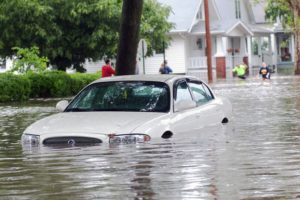 The flooding this year around the country has been devastating, and we have seen what damage it can do to homes, businesses and human lives. It can also affect your vehicle, and lead to some serious auto repairs, and if you’re not careful, can put your safety at risk on the roads.
The flooding this year around the country has been devastating, and we have seen what damage it can do to homes, businesses and human lives. It can also affect your vehicle, and lead to some serious auto repairs, and if you’re not careful, can put your safety at risk on the roads.
Residents of Texas, Florida and so many other areas have seen their homes and vehicles under water and the aftermath of what that causes. While everyone tries to put the pieces of their lives back together, we wanted to share some car care tips with you to ensure your vehicle is safe after a flood.
Think your vehicle needs repairs? We can help! Use these guidelines to check for water damage. Whether all or part of your vehicle has been under water, you should:
- Check the interior carpets, seats, door and trim panels and other components for dampness. If they seem wet, you should have a professional dry and treat them. Simply letting them dry on their own, could create mildew and a nasty smell! Seat brackets, motors and modules should also be checked for rust.
- Check the fluid dipsticks for your engine oil and transmission fluid – if the fluid appears milky, diluted, is no longer its original color or is beige in color, then it is likely the pans contain water. Don’t drive it! Have it towed to a trusted auto repair shop where an ASE-certified technician can check internal parts which may require extensive auto repairs.
- Check the air filter for water. Wet air filters should be replaced. Then, change the motor oil.
- Check your undercarriage, bumpers, radiator area and frame for mud, grass, dirt, debris and rust. Wash and clean them if there is any sign.
- Have your repair shop check the state of your brake system. Safety first!
- Check exterior lights for moisture or water. Replace headlights and bulbs that contain water.
- When your engine is running, listen for weird noises. Note where, when and what and take your vehicle to a certified repair technician.Pay particular attention to the alternator, serpentine belt, starter, power steering unit, air conditioner and wheel bearings.
- Check the suspension joints. They may need lubrication. Always check them for rust.
As with anything, the amount of water your vehicle took in will impact the severity of it’s needs. Just by being aware of the potential damage will make your vehicle safer down the road. Don’t wait for something to go wrong; let us check your vehicle for water damage. Make an auto repair appointment today.
Schedule My Appointment Now!
